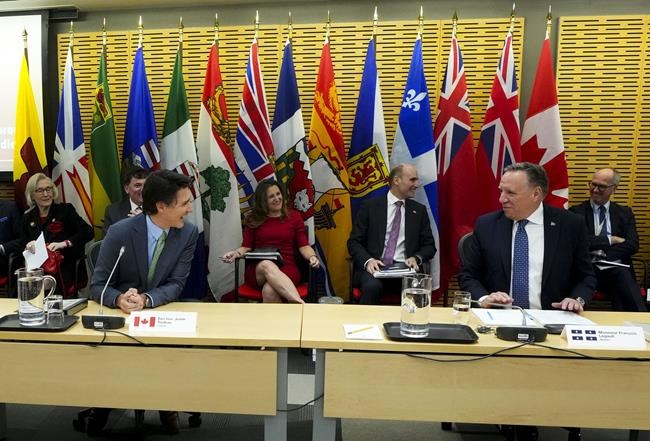“Trudeau Proposes New Funding Plan to Boost Health Care for Canadian Prime Ministers”
OTTAWA — The Premiers got a first look at Ottawa’s offer to increase long-term health funding at a meeting with Prime Minister Justin Trudeau on Tuesday, but the federal proposal falls short of what they were looking for.
The provinces budgeted about $204 billion for health care this fiscal year, and Canada’s health transfer was set at $45 billion, or about 22 percent of that. The prime ministers want the federal share to rise to 35 percent, which translates to another $26 billion this year alone.
Instead, Ottawa inked a 10-year, $196.1 billion deal, of which $46.2 billion is new funds.
The Liberals offer:
$2 billion, no questions asked
The federal government plans to introduce legislation before the end of March to distribute $2 billion to provinces to address immediate health needs like surgical backlogs.
There are no conditions.
Ottawa offered the same amount last year during the Omicron wave of COVID-19.
More money for the Canada Health Transfer
The main federal source of funding for health care comes from the Canada Health Transfer, the largest pool of money the federal government provides to the provinces and territories.
It is calculated based on minimum annual growth of three percent or the three-year moving average of nominal gross domestic product (GDP), whichever is higher.
Ottawa has now offered to raise the minimum annual increase to 5 percent for the next five years.
The total amount after the five years serves as a new starting point for the approximation.
The move is expected to bring provinces an additional $17.3 billion in new support over 10 years. The Federal Department of Finance expects CHT to grow 33 percent over the next five years and 61 percent over the next 10 years.
Everything depends on better data
The Canada Health Transfer increase is conditional on an agreement to share comparable data and to digitize Canadians’ health information so it can be more easily accessed and shared between hospitals, clinics and jurisdictions.
Tailored offers with each province
Ottawa has also tabled $25 billion for tailored one-to-one deals with each province to make progress on four key issues: family health services, health workforce shortages and backlogs, mental health and drug use, and health care modernization.
The offers will be very flexible for each province, but they have to show their work to get the money.
The government says it wants to see a plan from each province and targeted results they hope to achieve. The provincial and territorial governments must then report back on their progress.
Higher wages for HR professionals
Trudeau says he will give provinces $1.7 billion over five years to increase wages for personal assistants, who provide the bulk of bedside care in long-term care and in-home care.
No targets have yet been set for how high these wages should be. In the last election, Liberals pledged to increase pay for personal attendants to at least $25 an hour.
Indigenous Health
The federal government has committed $2 billion over 10 years specifically to ensure fair and equitable access to adequate health care for indigenous peoples through a health capital fund.
The spending comes after consultation with indigenous groups.
Other expenses
— $505 million over five years for the Canadian Institute for Health Information Canada Health Infoway and other federal data agencies to develop new health data indicators and create a “center of excellence” for health workforce data and support other efforts to modernize health data systems.
— $150 million over five years for the Territorial Health Investment Fund for medical travel and the delivery of health care in the territories.
This report from The Canadian Press was first published on February 7, 2023.
Laura Osman, The Canadian Press
Don’t miss interesting posts on Famousbio










